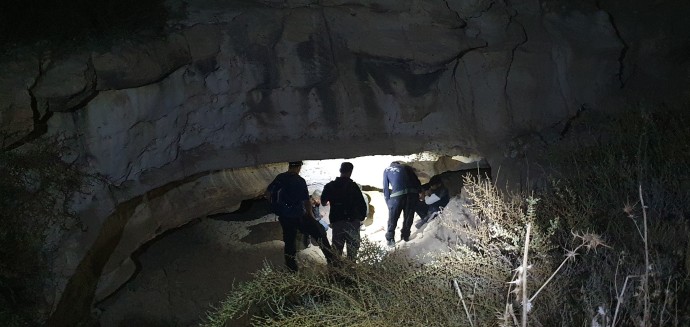Three antiquities robbers were caught red-handed on Tuesday while digging in an Ottoman well near the Rahat cemetery, the Antiquities Authority said in a statement. They destroyed ancient archaeological finds in the process, it said.
It is suspected that the robbers were looking for hidden treasure that, according to a legend circulating in the South, is buried in a well inside a cave.
“It is important that the public know that the rumor about the presence of treasure in the South has no archaeological or historical basis,” said Amir Ganor, director of the authority’s Robbery Prevention Unit. “Of course, no treasure has been found so far, but the archaeological sites have been irreparably damaged.”
"It is important that the public know that the rumor about the presence of treasure in the south has no archaeological or historical basis,"
Amir Ganor
The antiquities site of Horvat Maaravim, which contains antiquities from the Roman, Byzantine, early Muslim and Ottoman periods, is under the supervision of the Antiquities Authority.

Antiquities robbers caught in the act
The suspects were identified when they arrived at the site on Tuesday evening and entered the cave, where the hewn water well is, located on the southern side of the ruin.
Robbery Prevention Unit inspectors rushed to the scene, stealthily approaching the suspects while eluding their observers, and reached the entrance to the cave. They saw the suspects digging in the antiquities site and caught them.
The suspects, all in their 20s, were arrested in the area and taken, with the assistance of police officers and Rahat security guards, to the police station in the Bedouin city, where they were interrogated.
One of the suspects was caught and convicted of similar offenses in 2020 and already faces a suspended sentence of six months in prison and a NIS 30,000 fine.
“With the end of summer... we see an increase in the phenomenon of antiquities theft in the field,” Antiquities Authority Director-General Eli Escozido said.
“The inspectors of the Antiquities Authority face the phenomenon of antiquities robbery day and night,” he said. “The antiquities robbers rip the ancient finds from their historical story for the sake of money and thereby harm our heritage.”
Damage to an antiquities site is a serious criminal offense, with a statutory penalty of up to five years in prison, the Antiquities Authority said.
